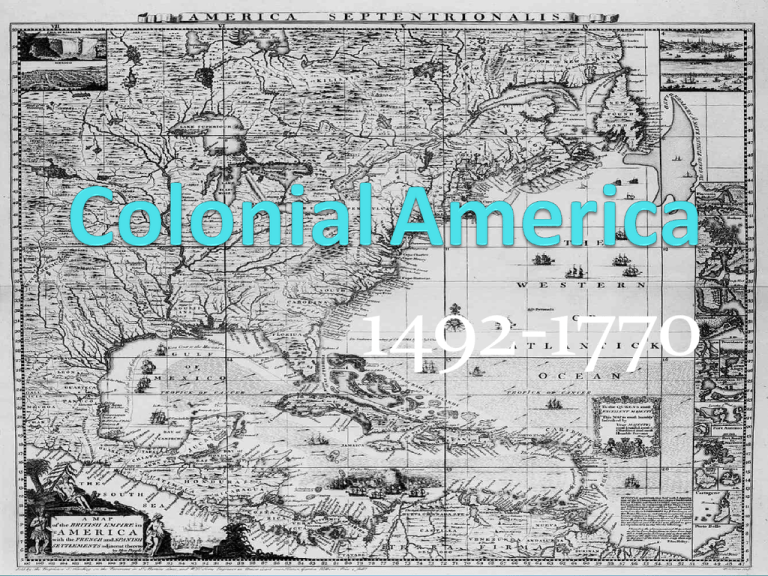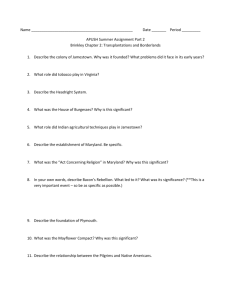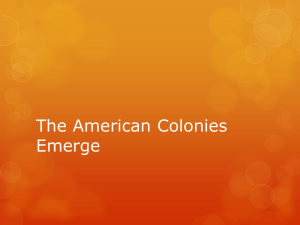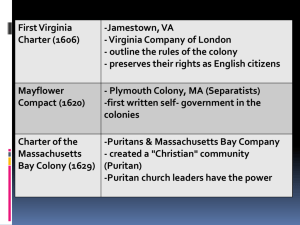CHPT4-5_EARLY COLONIAL ERA
advertisement

1492-1770 Early English Settlements Roanoke Island Sir Walter Raleigh Est. 1585-was the first attempt to colonize America by the British for POLITICAL reasons. Attempt to acquire more land for the British Empire 100 men After 1 year unhappy colonists decided to return to England. Early English Settlements The Lost Colony Sir Walter Raleigh 1587 was the 2nd attempt to colonize America by the British 91 men, 17 women & 9 children Virginia Dare was the first English settler to be born in America It is still a mystery as to what happened to the settlers. Only clue to their fate was the carving “CROATOAN” Early English Settlements Early English Settlements Jamestown Est. 1607 for Economic Reasons Charter – written permission to organize settlements in an area Virginia Company Joint stock companyinvestors buy stock in the company in return for a share of future profits. Made up of merchants (people who trade goods to make money). Early English Settlements Jamestown (Cont.) The Virginia Company was hoping to find gold and silver. Drawbacks of location: Poor farmland Swampy and infested with disease carrying mosquitos By spring of 1608 only 38 of 144 remained alive. Early English Settlements Jamestown (Cont.) Important People: Captain John Smith Forced settlers to work Explored the area Negotiated to get food from the Native American Powhatan Tribe John Rolfe Learned how to grow West Indies tobacco that helped the colony’s economy prosper. Married Pocahontas-the daughter of Chief Powhatan Early English Settlements Jamestown (Cont.) “The Starving Time”1609-1610 400 new arrivals Lack of leadership Food supplies ran out over the winter Fighting with Natives and cannibalism By spring of 1610 only 60 remained Early English Settlements Jamestown (Cont.) Economy Tobacco first sold in England in 1614 Colonists rented plots Grew food and tobacco to sell By 1618 private land ownership expanded Headright System 50 acres of land plus 50 acres per family member over 15 and 50 acres per servant brought to America Early English Settlements Jamestown (Cont.) Government Colonists grew tired of taking orders from the Virginia Company The House of Burgesses First form of representative government in the New World 10 towns in the colonies sent 2 representatives each to make the laws for the colony First met in a Jamestown church on July 30, 1619 Early English Settlements Jamestown (Cont.) Jamestown was the first successful English colony in the New World. Questions? What was Roanoke? Why was the House of Burgesses important? What was the name of the group of merchants that set up Jamestown? What is important about the year 1607? What did the early settlers of Jamestown hope to find? What crop helped the people of Jamestown to prosper? New England Colonies New Hampshire, Massachusetts, Connecticut, Rhode Island 1. Founded for the following reasons: a. Religious Freedom b. Political Freedom c. Economic New England Colonies Puritans vs. Pilgrims Puritan – wanted to reform the Anglican church. Would go on to found the colony of Massachusetts. Separatists - wanted to leave and set up their own churches The Pilgrims were Separatists who left for the New World on a pilgrimage. REFORM! NEW CHURCH! New England Colonies Massachusetts Founded for religious freedom Mayflower Pilgrims Sought to settle in Virginia but landed in Plymouth, Massachusetts in 1620. Chose to stay in Plymouth due to the approaching winter season. Almost half died during the first year due to malnutrition, disease and cold. New England Colonies Massachusetts(cont.) Pilgrims’ Government Mayflower Compact Pledged their loyalty to England and helped establish the laws of the colony. They set up self-government. An important step in the development of representative government in America New England Colonies Massachusetts(cont.) Important People William Bradford Pilgrims’ Leader & Historian Squanto & Samoset Squanto spoke English First Native Americans to meet the Pilgrims Taught Pilgrims how to hunt, fish and grow crops. Helped broker a treaty between Pilgrims & Wampanoag Massasoit A Wampanoag leader Signed treaty with Pilgrims New England Colonies Massachusetts(cont.) The First Thanksgiving Took place in the Autumn of 1621 A celebration of peace between 90 Native Americans and 50 Pilgrims Thankful to be raising food and for their survival 3 day feast New England Colonies Massachusetts(cont.) Massachusetts Bay Company Increased persecution of Puritans in England 1629-receive royal charter to colonize north of Plymouth in/around Boston Society based on the Bible “City upon a hill” Persecuted those that held other religious beliefs John Winthrop Colony’s governor New England Colonies New Hampshire Founded for economic and religious reasons Captain John Mason Fishing, lumbering, trade & ship building. John Wheelwright Led a group of dissenters from Massachusetts to practice religion freely New England Colonies Connecticut Founded for religious, political and economic reasons Better farmland Thomas Hooker Unhappy with John Winthrop and other Puritan leaders. Wanted more restrictions to government Led congregation from Massachusetts to Connecticut New England Colonies Connecticut(cont.) Fundamental Orders of Connecticut First written constitution in America Described the organization of representative government in detail New England Colonies Rhode Island Founded for Religious tolerance Dissenters were forced from Massachusetts Roger Williams Did not believe people should be forced to practice a particular religion Disagreed with taking land from Native Americans Anne Hutchinson Questioned authority of colony’s ministers Claimed god spoke to her directly Questions? What is the difference between a Puritan and a Pilgrim? Why was the Mayflower Compact an important step towards representative government? For what reasons were the New England colonies founded? What group founded Massachusetts? In what year did the Pilgrims land in the Americas? Where did the Pilgrims land? What is so significant about the Fundamental Orders of Connecticut? Middle Colonies New York, Pennsylvania, New Jersey and Delaware Founded for the following reasons: Religious Freedom Economic Middle Colonies New York Founded for Religious tolerance and for Economic reasons Originally a Dutch colony established by the West India Company to trade in America Peter Stuyvesant Dutch Colony Governor Surrendered New Amsterdam to the English Charles II gifts Colony to his brother, the Duke of York Renamed colony to New York Middle Colonies New York(cont.) Proprietary Colony Owner owns and controls the government of all the land By 1691 New York has an elected legislator Duke of York promises religious freedom People of New York First Jews in North America Dutch, Swedes, Native Americans and Puritans African slaves Middle Colonies New Jersey Founded for Religious tolerance Given to Lord John Berkely and Sir George Carteret by Duke of York Gave settlers large tracts of land Promised religious tolerance Trial by jury and represented assembly Made local laws and set tax rates But if you act now and move to New Jersey within the next 5 months, we’ll throw in all these extras for free! Middle Colonies Pennsylvania Founded for Religious tolerance Given to William Penn to repay King’s debt William Penn Believed in religious tolerance Believed in representative government Saw the colony as a “holy experiment” Quakers Everyone equal in God’s eyes No church Pacifists Middle Colonies Delaware Originally part of southern Pennsylvania Known as the “Three Lower Counties” Formed their own legislature and began functioning as a separate colony Questions? What were the Middle Colonies? Who were the Quakers? What are pacifists? What did William Penn do? What did he refer to Pennsylvania as? What were some things the colony of New Jersey offered settlers to entice them to settle? What were three reasons the Middle Colonies founded? Southern Colonies Maryland, Virginia, North Carolina, South Carolina and Georgia. Founded for the following reasons: Economic Religious Southern Colonies Virginia Founded for economic purposes Jamestown-1607 Looking for gold Ended up with prosperous tobacco plantations Begin to push west and settle new land. Causes conflicts with Native Americans Southern Colonies Virginia(cont.) William Berkeley Virginia’s Governor Brokered a treaty with the Native Americans Promised to prevent settlers from pushing further west in exchange for a large tract of land. Bacon’s Rebellion Nathanial Bacon Resented colonial government Led rebellion at Jamestown in 1676 Drove Berkeley into exile England sends troops to restore order Southern Colonies Maryland Founded for economic purposes and religious freedom. George Calvert, Lord Baltimore His son Cecil inherited colony Wished to establish a safe place for English Catholics Hoped to make a fortune Mason-Dixon Line Set boundary between Pennsylvania and Maryland Act of Toleration Guaranteed religious toleration Only lasted 43 years Southern Colonies North & South Carolina Founded for economic purposes Hoped to make money by selling and renting out land Constitution written by John Locke Main concern was principles and rights. Needed slave labor for growth and harvest of their crops. Rice and indigo were major crops grown there. 1729 – Divided up into North and South Carolina due to disputes over how the colony should be ruled Southern Colonies Georgia Founded for political purposes. James Oglethorpe Banned slavery, Catholics and Rum Founded as a place where debtors, the poor and some criminals could make a fresh start rather than go to jail Could protect other colonies from Spanish attack from the south. Other Empires New France Established in Canada and along the Mississippi River . Had good relations with the Native Americans. Mostly interested in the fishing and fur trapping economy. Other Empires New Spain Controlled Mexico, Caribbean, Central and South America Created missions to convert native people to the Catholic faith Questions? Why did George Calvert establish the colony of Maryland? Why did Bacon oppose the colonial government? How did Georgia serve as protection for the English colonies? Why were the Southern colonies founded? What were some cash crops grown in the Southern colonies? Why did France begin exploring and settling the New World? Why did Spain begin exploring and settling the New World? LIFE IN THE NEW ENGLAND COLONIES GEOGRAPHY Climate: The Climate in the New England colonies was colder than the other two regions due to the northern location. Geography: The geography of New England was mostly hills and rocky soil. Natural Resources: The natural resources of New England were fish, whales, trees, and furs. ECONOMY Some major businesses in the New England colonies were shipbuilding, fishing, fur trapping and trade LIFE IN THE MIDDLE COLONIES GEOGRAPHY Climate: The climate in the Middle Colonies was relatively hot. This allowed for a longer growing season. It was warmer than its northern counterpart New England but cooler than the Southern colonies Geography: The geography of the middle colonies was made up of hills and flat lands with good soil. Natural Resources: The natural resources of the middle colonies were iron ore and good soil. ECONOMY The Middle colonies made money by farming cash crops and industries such as lumber and mining. LIFE IN THE SOUTHERN COLONIES GEOGRAPHY Climate: The climate in the southern colonies was the warmest of the three regions and boasted the longest growing season. Geography: The geography of the Southern Colonies which had a broad, coastal plain that was hilly and covered with forests. Natural Resources: The natural resources found in the south were the rich farm lands, forests, and fish. ECONOMY The Southern Colonies had an agrarian economy. They grew cash crops (tobacco, rice, cotton, indigo). The Triangular Trade? It was a trade route that exchanged goods between Europe, the Americas and West Africa. The Middle Passage The part of the Triangular Trade which shipped slaves to the Americas. SLAVE CODES Slave codes were strict rules stating how slaves should behave and how they would be punished. Examples of some slave codes: Slaves cannot leave the plantation without written permission. It was illegal to teach slaves to read and write. Slaves would be whipped for minor offenses and hanged or burned to death for serious crimes. CULTURE IN THE COLONIES THE GREAT AWAKENING 1720’s-1740’s A return to strong religious beliefs in the colonies. More people went to churches and new denominations started forming. More people began believing that all people were equal in the eyes of God. Jonathan Edwards Delivered powerful and convincing sermans George Whitefield Spread revivals throughout the colonies CULTURE IN THE COLONIES The Enlightenment a movement that began to spread the idea that knowledge, reason and science could improve society. Education Primary purpose was to make sure everyone could read and study the Bible. Family Life Family was the foundation of colonial life Women tended to domestic affairs Men were heads of household and managed the farm GOVERNMENT Glorious Revolution England parliament replaced James II with William & Mary Showed power of elected representatives English Bill of Rights William & Mary forced to sign Grants certain basic rights to all citizens Inspired the creation of our Bill of Rights Voting Only white men who owned property had the right to vote. Women, indentured servants, landless poor and African slaves could not vote.



